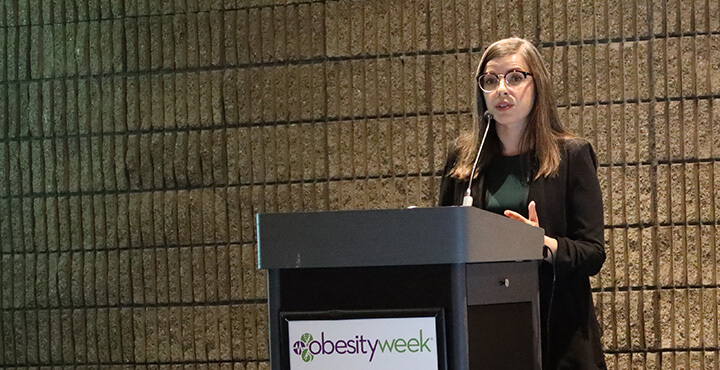News Feed

Pennington Biomedical’s Dr. Catherine Prater Awarded Postdoctoral Fellowship from the American Heart Association
Dr. Catherine Prater, postdoctoral researcher at Pennington Biomedical Research Center, has received a two-year fellowship from the American Heart Association. The fellowship includes a grant of more than $150,000 that will support research focused on weight gain markers. Her research project, “Examination of Metabolic Characteristics in the Predisposition for Weight Gain,” will reexamine existing clinical trial data with the goal of improving prediction models and uncover metabolic markers that explain individual differences in weight gain.
Learn More
Pennington Biomedical’s Dr. Candida Rebello Secures $3.7 Million NIH Grant to Study Muscle Retention in Older Adults
Pennington Biomedical Research Center scientist Dr. Candida Rebello recently secured a $3.7 million, five-year grant from NIH’s National Institute on Aging to explore lifestyle-focused care strategies to reduce excess body fat and declining muscle mass in older adults with obesity, also known as sarcopenic obesity. The grant will facilitate the planning and structure of the clinical trial laid out in her project “Lifestyle intervention to improve muscle function in older adults.”
Learn More
Pennington Biomedical’s Greaux Healthy Initiative Addresses Childhood Obesity as It Tours Houma-Thibodaux Region
The Pennington Biomedical Research Center’s Greaux Healthy initiative is set to embark on a significant outreach tour throughout the Houma-Thibodaux region January 26-30. As childhood obesity rates in Louisiana rank among the highest in the nation, the Greaux Healthy initiative seeks to engage local education, healthcare, business, and government leaders in a collaborative effort to address this pressing health crisis.
Learn More
In U.S. News & World Report’s 2026 Best Diets, DASH Diet Again Recognized as Best Heart-Healthy Diet
For the second year in a row, the Dietary Approaches to Stop Hypertension, or DASH Diet, developed in part by scientists at Pennington Biomedical Research Center, has been recognized as the best heart-healthy diet in the 2026 U.S. News & World Report Best Diets rankings. Additionally, it again ranked as the second-best diet overall.
Learn More
Pennington Biomedical Researchers Explore Factors Behind Body’s Ability to Regulate Weight
Pennington Biomedical researchers recently investigated the systems of the body that regulate weight, exploring whether our bodies defend an established weight target or if our bodies operate within a broader range of tolerance before biological mechanisms are activated. The paper, titled “Body weight regulation models in humans: insights for testing their validity,” which was recently published in Nature Reviews Endocrinology, examined competing body weight regulation models and analyzed how energy intake and expenditure interact to maintain or disrupt weight stability.
Learn More
Elizabeth Stanley Named Associate Executive Director of Operations
Pennington Biomedical Research Center has announced the appointment of Dr. Elizabeth S. Stanley as Associate Executive Director of Operations, effective January 20, 2026. Stanley, who joined the Center in November as Senior Director for Operations and Finance, assumes the role following the transition of longtime operations leader Guy LaVergne, who is stepping down from his full-time position as Associate Executive Director after 27 years of service to the Center. LaVergne will continue supporting the Center in a part-time advisory and consulting capacity, working closely with Stanley and executive leadership to ensure continuity and strategic momentum during the transition.
Learn More
Pennington Biomedical’s Dr. Gang Hu Appointed to NIH Reproductive, Perinatal and Pediatric Health Review Group
Pennington Biomedical’s Dr. Gang Hu of the Center’s Chronic Disease Epidemiology Lab was recently appointed to serve as a member of the Integrated Review Group (IRG) for the NIH Reproductive, Perinatal and Pediatric Health (RPPH) Study Section. The IRG for the RPPH’s Previews applications submitted to the NIH, makes recommendations on the applications to the appropriate NIH National Advisory Council, and surveys the status of research in the field of population science and epidemiology.
Learn More
Dr. Jennifer Rood to Lead Pennington Biomedical Research Center as Interim Executive Director
Pennington Biomedical Research Center’s Associate Executive Director for Cores and Resources, Dr. Jennifer Rood, has agreed to serve as Interim Senior Vice Chancellor and Executive Director while an international search for the Center’s next Executive Director is underway. Dr. Rood began her term as Interim Executive Director on Jan. 1, 2026, and is working closely with LSU leadership and Center representatives to identify a new full-time Executive Director.
Learn More
2025 was a Year of Success for Pennington Biomedical, filled with Scientific Discoveries, Impactful New Collaborations and Strategic New Hires
Since the early days of January through December, the research scientists, faculty, staff and leadership of Pennington Biomedical Research Center helped make this year one of the most impactful in the Center’s near 40-year history. From its 222-acre campus in Baton Rouge, Pennington Biomedical is working on cutting-edge research to fight chronic disease, along with sharing its insights and influence on a global stage and fostering new collaborations to advance both the Center and the field of metabolic health.
Learn More
Pennington Biomedical Celebrates a Year of Small Shifts
As 2025 draws to a close, LSU’s Pennington Biomedical Research Center is proud to look back on a full year of its Small Shifts campaign – an initiative designed to show that small, manageable changes in daily routines can lead to major improvements in health, well-being and overall quality of life.
Learn More
LSU Board of Supervisors Provides Continued Authorization of the Institute of Dementia Research & Prevention
On Dec. 11, Pennington Biomedical's Dr. Jeff Keller, Director of the Institute for Dementia Research & Prevention (IRDP), presented a report on the accomplishments of the Institute over the past several years to the LSU Board of Supervisors.
Learn More
Pennington Biomedical Makes History with First-Ever International Symposium in Riyadh
Pennington Biomedical Research Center marked a major milestone this past week with the successful launch of its first international scientific symposium: the Pennington Obesity and Metabolic Disease Symposium, held December 6, in Riyadh, Saudi Arabia. The event concluded an extraordinary week of high-level partnership-building across the Gulf region, further solidifying Pennington Biomedical as a premier U.S. collaborator in support of the Kingdom of Saudi Arabia’s Vision 2030 health transformation goals.
Learn More
Do You Have “The Answer?” Find Out at Pennington Biomedical Research Foundation’s Premier Gala
“The Answer,” the annual premier gala for the Pennington Biomedical Research Foundation, will be held at the L’Auberge Casino and Hotel Event Center on Friday, March 27, 2026, with members of the Greater Baton Rouge community and beyond invited for a night of trivia, entertainment, a live and silent auction and more. For more than 10 years, the Pennington Biomedical Research Foundation has held the annual gala to support innovative, life-changing discoveries at the world-renowned Pennington Biomedical Research Center.
Learn More
"Louisiana: The State We're In" on Pennington Biomedical's Greaux Healthy Initiative
Louisiana now ranks fourth in the nation for adult obesity, according to new CDC data — a position the state consistently holds just behind West Virginia, Mississippi, and Arkansas. A doctor at Pennington Biomedical in Baton Rouge explains the factors driving Louisiana’s high rates, as the center rolls out new initiatives to fight obesity. That includes Greaux Healthy, a statewide effort aimed at helping families build healthier habits. LPB’s Christina Jensen reports. Louisiana: The State We're In (SWI) SWI is Louisiana's only statewide news magazine. The program airs Fridays at 7 p.m. and Sundays at 4:30 p.m. on the six-station LPB network that includes stations in Alexandria, Baton Rouge, Lafayette, Lake Charles, Monroe, and Shreveport. This award-winning show combines in-depth coverage about the important issues in the state along with expert analysis.
Learn More
Pennington Biomedical Appoints Dr. Corby Martin as the Associate Executive Director for Scientific Education
LSU’s Pennington Biomedical Research Center announced that Dr. Corby Martin has been appointed as the Associate Executive Director for Scientific Education, effective November 1, 2025.
Learn More
Severity of Obesity Closely Associated with Likelihood of Disease Burden in US National Study
Obesity severity is incrementally associated with a broad range of cardiometabolic and renal disease burden, as discovered by researchers at Pennington Biomedical Research Center. Recently published in Obesity, the paper “Association of Obesity Severity with Cardiometabolic and Renal Disease Burden in the United States,” explored the relationship through a cross-sectional study of data from the U.S. Behavioral Risk Factor Surveillance System survey.
Learn More
Pennington Biomedical’s Dr. Leanne Redman Recruited to Lead the Charles Perkins Centre at the University of Sydney
Following an extensive worldwide search, Dr. Leanne Redman has been appointed Academic Director of the Charles Perkins Centre, the University of Sydney’s first and largest multidisciplinary research initiative. A Professor of Clinical Science, Dr. Redman currently holds a number of positions at LSU’s Pennington Biomedical Research Center including the LPFA Endowed Chair in Nutrition and Associate Executive Director for Scientific Education. Over the past twenty years, she has pioneered groundbreaking research on women’s health issues, including the study of obesity in pregnancy, the optimisation of maternal nutrition and childhood obesity prevention.
Learn More
Pennington Biomedical Encourages “Small Shifts” for a Healthier, More Energized Holiday Season
As the holiday season approaches, Pennington Biomedical Research Center is sharing tips and advice to help families enjoy their celebrations while feeling their best. Building on the Center’s popular “Small Shifts” campaign, the message this year is simple: even modest changes to how we approach food, movement, and mindfulness can make a big difference in our energy, health, and enjoyment.
Learn More
Four Pennington Biomedical Researchers Recognized among the World’s Most Highly Cited Researchers
Four researchers from LSU’s Pennington Biomedical Research Center have been named among the world’s most highly cited scientists, according to the 2025 Highly Cited Researchers list from Clarivate Analytics. Pennington Biomedical’s Dr. Steven Heymsfield, Dr. Peter Katzmarzyk, Dr. Eric Ravussin, and Dr. Donna Ryan are recognized among the top 1 percent of researchers whose work has demonstrated significant and broad influence in their respective fields. The list identifies scientists whose publications rank among the most cited globally over the past 11 years, as measured in the Web of Science database.
Learn More
Dr. Ann Coulter of Pennington Biomedical Presents New Approach to Fat Metabolism Activation Therapies at Bio on the Bayou Conference
Dr. Ann Coulter of Pennington Biomedical Research Center recently presented research on a novel nutritional supplement that targets fat cells to stimulate weight loss at the Bio on the Bayou conference in New Orleans.
Learn More


